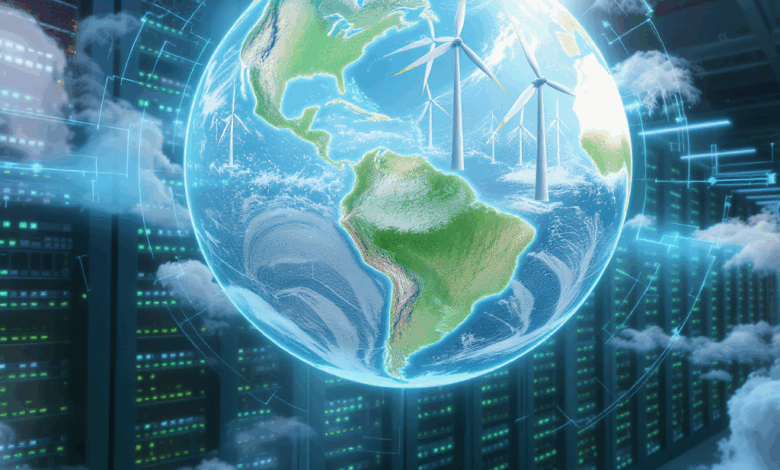Can Eco-Friendly Web Hosting Really Power Your Website and the Planet?

Have you ever paused to think about the invisible energy your website consumes every day? I remember the moment I realized that every click, every page load, and every online transaction quietly adds up to a surprisingly significant carbon footprint. It was unsettling — a mix of curiosity and concern — and it nudged me into exploring eco-friendly web hosting solutions. But can going green online really make a difference without sacrificing speed or reliability?
Imagine your website humming away, powered not by coal or gas, but by the gentle push of renewable energy sources. This isn’t some distant fantasy; it’s happening now. Hosting companies are stepping up, integrating wind, solar, and other sustainable energies into their operations, sometimes even buying triple the renewable energy they consume. That’s the case with GreenGeeks, a company that not only powers its data centers with clean energy but backs that commitment by purchasing renewable energy credits at three times their usage. It’s a bold promise that challenges the usual trade-off between performance and sustainability.
Yet, the real question is: how do these providers balance green credentials with the needs of tech enthusiasts and business professionals like us, who demand both eco-consciousness and cutting-edge performance? Companies such as A2 Hosting have paired their carbon-neutral ambitions with high-speed Turbo servers, aiming to deliver both fast loading times and a lighter environmental footprint. Meanwhile, HostPapa targets small businesses, weaving sustainability directly into their customer dashboards, making it easier to track and feel connected to the green journey.
It’s not just about energy sources. Data centers are embracing AI-driven management and advanced cooling systems, slashing energy consumption in subtle yet impactful ways. DreamHost, for instance, doesn’t stop at renewable energy; they’ve committed to becoming fully water-neutral by 2026, a reminder that sustainability is multi-dimensional.
But as we wade deeper into this landscape, questions naturally arise. How can we verify these green claims? What certifications really matter, and how transparent are these companies about their practices? Some providers have earned EPA Green Power Partner status, while others engage in tree-planting initiatives for every hosting plan sold, weaving environmental action back into their business models.
If you’re considering a switch to eco-friendly hosting, it’s tempting to feel overwhelmed by choices and technical jargon. Yet, the process can be surprisingly straightforward. Assess your website’s needs—whether shared or dedicated hosting—then look closely at a provider’s sustainability practices, performance metrics, and customer support. And don’t overlook pricing details, including renewal rates, which can sometimes catch you off guard.
This isn’t just about making a purchase; it’s about aligning your digital presence with a growing movement toward responsible, ethical business practices. Selecting an eco-friendly host isn’t merely a technical decision; it’s a statement that you and your business care about the planet, even in the digital realm.
So, what do you think? Could your next website hosting choice be a small but meaningful step toward a more sustainable future? Or is the challenge of balancing performance and green credentials still too daunting? Perhaps, as we explore this evolving field together, new paths and possibilities will emerge—ones that reshape not only how we host websites but how we envision our role in the digital ecosystem.
When Green Meets Speed Navigating the Path to Eco-Friendly Web Hosting
I find myself often reflecting on how the choices we make online ripple out into the physical world. Hosting a website might seem like an invisible act, tucked away in the cloud, but the energy behind that cloud is very real — and increasingly, it’s becoming a focal point for those of us who want our digital presence to be more than just efficient; we want it to be responsible.
So, how do we step onto this path of eco-friendly web hosting without losing the performance and reliability that our businesses and projects demand? The truth is, it’s a balancing act — but one that’s increasingly achievable thanks to thoughtful innovations and shifting industry standards.
Understanding Your Hosting Needs The First Step Toward Green
Before diving into the sea of green hosting providers, it helps to clarify what kind of hosting truly suits your website. Are you running a small blog, a bustling e-commerce platform, or perhaps a portfolio site? Shared hosting might suffice for smaller projects, offering cost-effectiveness and a lighter carbon footprint. But growing businesses or high-traffic sites might require VPS or dedicated servers, which naturally consume more energy but can still be optimized for sustainability.
By matching your hosting type with your actual needs, you avoid unnecessary resource consumption — a foundational step in eco-conscious web management.
Peeling Back the Green Curtain What to Look for in Providers
Not all green claims are created equal. I’ve learned to look beyond the marketing buzz and focus on concrete actions:
-
Renewable Energy Usage: Providers like GreenGeeks don’t just talk the talk; they purchase renewable energy credits that triple their own consumption, effectively pushing the grid toward cleaner sources.
-
Carbon Offset Partnerships: Companies such as A2 Hosting collaborate with organizations like Carbonfund.org, actively compensating for emissions through environmental projects.
-
Sustainable Infrastructure: Advanced cooling techniques and AI-driven energy management in data centers, as seen with DreamHost, reduce the environmental impact beyond just energy sourcing.
-
Certifications and Transparency: EPA Green Power Partner status or transparent sustainability reports lend credibility, allowing us to peek behind the scenes and assess true commitment.
Performance Doesn’t Have to Be a Victim of Sustainability
One concern that lingers is whether green hosting sacrifices the speed and uptime we rely on. The good news? Providers are innovating here too:
-
Turbo Servers and Optimized Hardware: A2 Hosting’s Turbo servers, for instance, aim to deliver snappy load times without compromising their carbon-neutral goals.
-
Scalable Resources: GreenGeeks offers scalable hosting plans, meaning you can adjust your resource use according to actual demand, avoiding waste.
-
Customer Support and Reliability: Sustainable hosting doesn’t mean cutting corners on service. Many eco-friendly hosts maintain robust support teams dedicated to keeping your site running smoothly.
Practical Steps to Embrace Eco-Friendly Hosting Today
-
Audit Your Current Hosting Footprint: Use tools or contact your provider to understand your site’s energy consumption and carbon footprint.
-
Identify Your Website Needs: As discussed, clarify hosting type and resource requirements to avoid over-provisioning.
-
Research Providers’ Green Credentials: Look for renewable energy commitments, carbon offset programs, and industry certifications.
-
Compare Performance Metrics: Check uptime guarantees, server speeds, and customer reviews to ensure quality.
-
Evaluate Pricing and Contracts: Understand initial and renewal costs, and any terms related to sustainability claims.
-
Test and Monitor: If possible, trial a green hosting service and monitor your website’s performance and your own satisfaction.
Reflecting on Our Role in the Digital Ecosystem
Choosing eco-friendly hosting feels like a small step in the vast digital universe, yet it’s a tangible way to align our online activities with broader environmental values. It opens up questions about responsibility, transparency, and how technology can evolve to serve us without costing the earth.
Are we ready to embrace this shift wholeheartedly? Or will concerns about cost, complexity, or performance keep us tethered to traditional hosting? Perhaps the true challenge lies not just in selecting a provider, but in redefining how we think about our digital footprint — inviting us to become more mindful participants in the web’s future.
What do you think? Could your next hosting decision be a quiet revolution, or is this balance still a work in progress for us all?

Reflecting on the journey through eco-friendly web hosting, it’s clear that the digital choices we make ripple far beyond the screen—each decision intertwines with environmental responsibility and technological innovation. We’ve seen how providers like GreenGeeks and A2 Hosting are not just green in name but actively reshape the hosting landscape through renewable energy commitments and performance-driven solutions. This means that embracing sustainability online doesn’t force us to compromise on speed or reliability; rather, it invites us to rethink what efficiency truly looks like in a world striving for balance.
This exploration offers more than just technical insights—it reveals a path where our digital presence harmonizes with a broader ethical vision. By acknowledging the energy behind our websites and scrutinizing providers’ green credentials, we empower ourselves to make informed choices that resonate with personal and professional values.
Now, what can you do? Start by auditing your current hosting footprint and clarifying your site’s needs. Dive into researching providers’ sustainability practices alongside their performance metrics. Don’t hesitate to test services firsthand, allowing your own experience to guide your commitment. These steps not only reduce your carbon footprint but also position your project within a growing movement toward responsible technology.
Looking ahead, the evolution of eco-friendly hosting suggests a future where sustainability and innovation advance hand in hand—where AI-driven efficiencies and renewable energies become standard, and transparency becomes the norm. It challenges us to redefine our digital habits and embrace a mindset that values not just what our websites do, but how they do it.
So, as we stand at this crossroads, I ask you: Could your next hosting decision be more than a technical choice—could it be a quiet revolution toward a greener internet? The balance may still be unfolding, but together, our curiosity and action can shape a more sustainable digital ecosystem. If this resonates with you, why not take that first step today and explore what eco-friendly hosting might mean for your own corner of the web?





